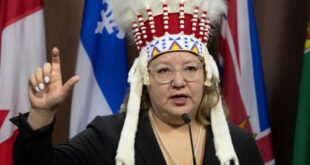Renters are selling themselves to landlords, with Metro Vancouver rents Canada’s highest
In 2018, teen brothers Hudson and Jackson Forsyth-Beck started growing veggies in the front yard of their rental home in Squamish, B.C., selling pickles.
That turned into a busy farm stand over the years.
But now, their family is facing eviction. Their father Robert Forsyth posted a video in a Facebook group appealing for help to find a home — and freezer space — to save about 10,000 pounds of produce, pies and preserves.
"If anybody has any solutions, maybe options," he said in a post on Feb. 25.
That began an all-consuming hunt to find a place to live, where his boys can grow up and keep growing their farm stand business.
"It's almost a full-time job looking for a place," said the 47-year-old father, who is a construction worker, earlier this month.
His family is just one of many you can find online, especially in housing forums, competing for rentals in Canada's toughest housing market: British Columbia, where an apartment costs on average $2,481 per month.
Housing policy experts say renters with few options are desperate to try to find an affordable — or at least available — place.
Often, that's people who describe facing eviction. Many say they have been pushed out, so the landlord can hike rent, often doubling it. In turn, landlords say they need more flexibility to move bad renters out.
The fierce competition is driving some tenants to pitch themselves to potential landlords in new ways. Now, some are putting not only their rental histories and credit scores on the table: they're also crafting online posts to highlight their qualities as renters — like personality, family values or skills — to rise above the pack and stand out.
The pickle boys' eviction
For the past seven years, Forsyth has paid $1,700 a month for a unit in Squamish.
When his new neighbours told him their rent was $2,900, he got worried. Then came the dreaded eviction notice in December. He's since applied for dozens of places. This week, he got a lead on a unit in Langley that he hopes works out.
In the meantime, he's agreed to pay a higher rent to stay in place for now, and he predicts his cost of living will likely triple.
"I am stressed and worried," he said.
"It's almost like you're paying a mortgage at the rate at some of the [rental] homes."
Canadian rent up average of $384 per month since 2022
More and more young families are being locked out of the housing market as rental costs skyrocket, says Paul Kershaw, a policy professor at the University of British Columbia's School of Population and Public Health, especially in hotspots like Vancouver and Burnaby.
"It breaks my heart to hear," said Kershaw. "Like, 'I have to advertise to see if someone will welcome me into their rental and let me pay an exorbitant amount of money for a one-bedroom.
"A younger demographic is working hard, and their hard work isn't paying off like it used to."
In February, Vancouver had the highest average rent for a one-bedroom unit in the country, at $2,653 per month, according Rentals.ca and Urbanation.
Burnaby, Victoria and Surrey were also among the highest. Rentals.ca says it can't provide an average rate for Squamish, where Forsyth and his family live, as there are too few listings.
Since 2022, the average monthly rent for a one-bedroom across Canada has risen about 21 per cent, or $384.
The rapid rise of rent in the country is "unrelenting," said Shaun Hildebrand, president of Toronto-based Urbanation, in an interview last month.
He called the current rent stock "grossly insufficient" to meet rising demand.
Evictions a concern
Price inflation is driving evictions, renters say. Some tenants believe their landlords are trying to move them out to cash in on new prices. And although tenants can take legal action for breaches, theprocess can take years and often yields little.
In B.C., no-fault evictions are only permitted if the landlord or their family is moving into the unit, or it's being demolished, renovated or sold, and they require several months' notice. The province had the highest rate of no-fault evictions in Canada, according to UBC research in 2023.
"This process can be very stressful, and amplify the sense of housing insecurity," said Kershaw.
"It's hard to go back and create affordability."
The B.C. government has taken steps to address the issue, like by taking control of municipal zoning to allow multiple units to be built on land previously designated for single-family use.
It's also enacted taxes and policies to discourage short-term rentals, empty investment homes and foreign buyers.
Landlords take issue with current tenant laws, too. They say the rules leave them stuck with losses if they pick the wrong tenant.
Baldeep Jhand, president of the Landlord's Rights Association of B.C., says many owners just opt not to rent anymore, after a renter damages property or fails to pay rent.
"Tenancy laws are being misused badly by the professional tenants. Only a few of them, but they are misusing it. So landlords are now more cautious."
Good wage, still no rental
Even higher-income renters are feeling the squeeze.
Reid Madiuk, a custom home builder, and his wife, a naturopath, have been evicted from their unit in Squamish, the family's second eviction since 2020.
To find a place, he posted in a Facebook group a gallery of his outdoorsy family, with promises to be quiet, clean and rarely home.
"Sometimes I struggle with what I'm doing for work. Am I part of the problem or am I part of the solution? But, you know, you have to make money to survive," he said.
Burnaby chef Kumariah Shunmugavadivel and his wife Niranjana Kumariahare also moving, with their nine-month-old, to take over a bakery business.
It took them months to find a rental in Burnaby, and now they must move to Vancouver Island, where they are struggling to find anything family-friendly for $2,300 a month. He says he's never seen anything like this.
"I worked in the States, I worked in Bermuda islands and different countries. But I have never had this kind of competition for renting a house anywhere," he said.
The couple have spent three months looking, from Langford to Sidney. To highlight their family to potential landlords, they posted a photo in a Facebook housing group with their child, posed in front of a wooly mammoth at a Victoria museum.
"You need to stand out of the crowd."
ABOUT THE AUTHOR
CBC journalist
Yvette Brend works in Vancouver on all CBC platforms. Her investigative work has spanned floods, fires, cryptocurrency deaths, police shootings and infection control in hospitals. “My husband came home a stranger,” an intimate look at PTSD, won CBC's first Jack Webster City Mike Award. Got a tip? Yvette.Brend@cbc.ca
*****
Credit belongs to : www.cbc.ca
 MaharlikaNews | Canada Leading Online Filipino Newspaper Portal The No. 1 most engaged information website for Filipino – Canadian in Canada. MaharlikaNews.com received almost a quarter a million visitors in 2020.
MaharlikaNews | Canada Leading Online Filipino Newspaper Portal The No. 1 most engaged information website for Filipino – Canadian in Canada. MaharlikaNews.com received almost a quarter a million visitors in 2020.







